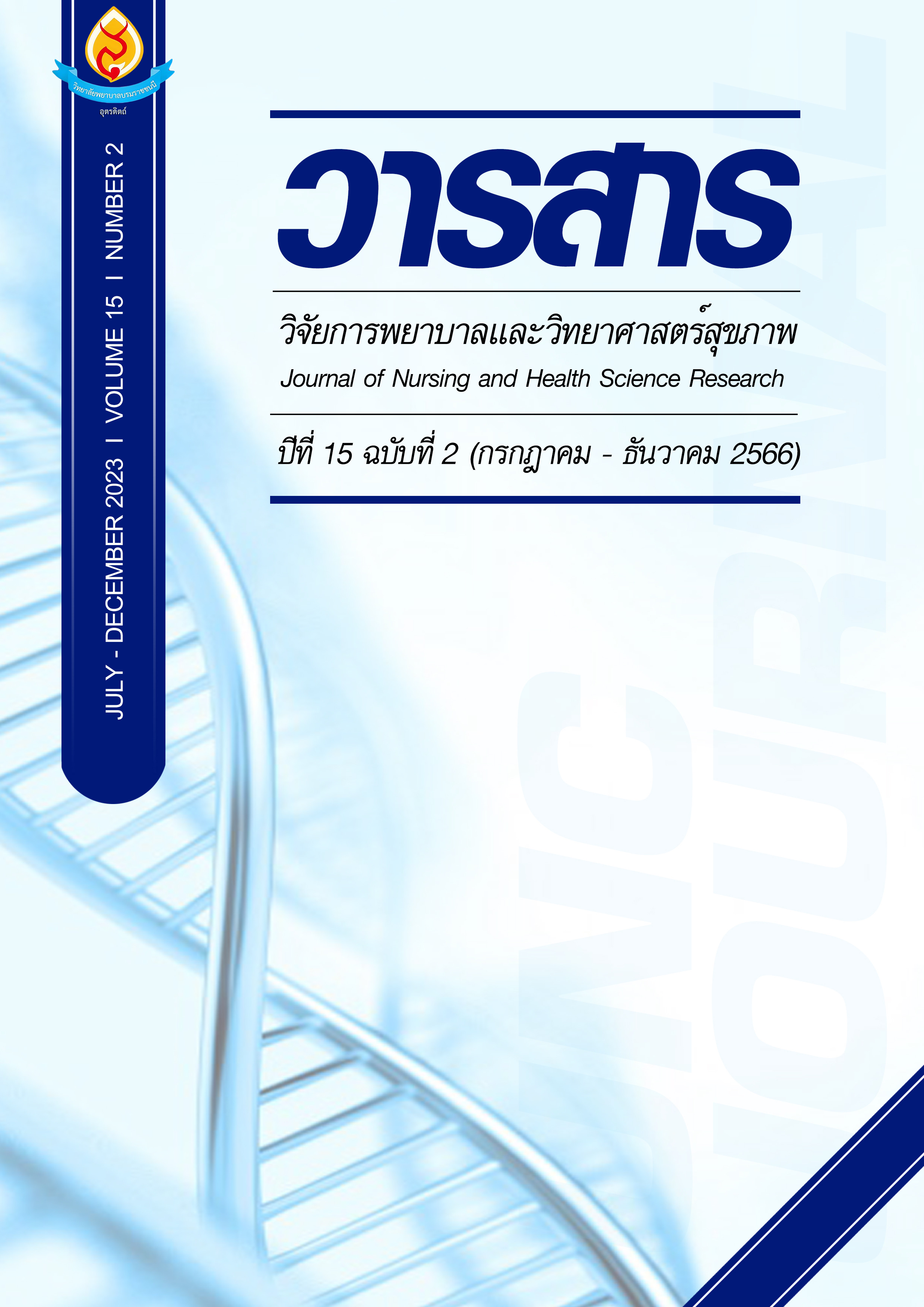การพัฒนาโปรแกรมการสร้างทักษะดูแลสุขภาพทางเพศ และพฤติกรรมป้องกันความเสี่ยงทางเพศในวัยเจริญพันธุ์
Main Article Content
บทคัดย่อ
การวิจัยครั้งนี้ใช้รูปแบบการวิจัยและพัฒนามีวัตถุประสงค์เพื่อศึกษาข้อมูลพื้นฐานเพื่อพัฒนาโปรแกรมและเพื่อศึกษาประสิทธิผลของโปรแกรมการสร้างทักษะการดูแลสุขภาพทางเพศและพฤติกรรมป้องกันความเสี่ยงทางเพศในวัยเจริญพันธุ์ ประกอบด้วย ขั้นตอนที่ 1 ศึกษาข้อมูลพื้นฐาน ขั้นตอนที่ 2 การทดลองใช้ และขั้นตอนที่ 3 การประเมินผล กลุ่มตัวอย่างในขั้นตอนที่ 1 เป็นผู้ทรงคุณวุฒิ จำนวน 5 คนและตัวแทนผู้บริหารโรงเรียน ผู้ปกครอง พยาบาลวิชาชีพและนักเรียน จำนวน 21 คน ขั้นตอนที่ 2 นักเรียนชายและหญิงในระดับมัธยมศึกษาปีที่ 1-3 ที่มีอายุระหว่าง 13-15 ปี จำนวน 120 คน โดยใช้วิธีสุ่มอย่างง่าย เก็บข้อมูลด้วยการสัมภาษณ์และตอบแบบสอบถาม การวิเคราะห์ข้อมูลใช้สถิติร้อยละ ค่าเฉลี่ย การเปรียบเทียบค่าเฉลี่ยแบบสองกลุ่ม และการวิเคราะห์ความแปรปรวนแบบวัดซ้ำ
ผลการวิจัยพบว่า 1) ผู้เชี่ยวชาญและผู้มีส่วนได้ส่วนเสียเห็นว่าการใช้รูปแบบการให้ข้อมูลข่าวสาร การสร้างแรงจูงใจ และการฝึกทักษะในการปฏิบัติพฤติกรรม เป็นแนวทางที่เหมาะสมในการพัฒนาโปรแกรม โดยควรเสริมความรู้ให้แน่น ปรับเปลี่ยนทัศนคติด้วยการสร้างแรงจูงใจ เสริมสร้างการเรียนรู้ผ่านประสบการณ์จริง เสริมกิจกรรมเปิดใจพ่อแม่พูดคุยเรื่องเพศกับลูก 2) โปรแกรมประกอบด้วยขั้นตอนการให้ข้อมูลข่าวสาร ขั้นตอนการสร้างแรงจูงใจ และขั้นตอนการสร้างทักษะในการปฏิบัติพฤติกรรม โดยใช้เวลา 7 ครั้ง ครั้งละ 1-2 ชั่วโมง 3) ประสิทธิผลของการใช้โปรแกรม พบว่าหลังการเข้าร่วมโปรแกรม 1 และ 4 สัปดาห์ กลุ่มทดลองมีคะแนนเฉลี่ยทักษะการดูแลสุขภาพทางเพศและพฤติกรรมป้องกันความเสี่ยงทางเพศสูงกว่าก่อนเข้าโปรแกรม อย่างมีนัยสำคัญทางสถิติที่ระดับ .01 และพบว่าหลังได้รับโปรแกรม 1 และ 4 สัปดาห์ กลุ่มทดลองมีคะแนนเฉลี่ยทักษะการดูแลสุขภาพทางเพศและคะแนนเฉลี่ยพฤติกรรมป้องกันความเสี่ยงทางเพศสูงกว่ากลุ่มควบคุมอย่างมีนัยสำคัญทางสถิติที่ระดับ .05 และ .01 ตามลำดับ
การมีส่วนร่วมของครอบครัวเป็นสิ่งสำคัญในการในการแก้ไขปัญหาอนามัยเจริญพันธุ์ในวัยรุ่น หากครอบครัวเปิดใจพูดคุยเรื่องเพศกับวัยรุ่นร่วมกับการเสริมความรู้ การสร้างแรงจูงใจ และฝึกทักษะเกี่ยวกับการดูแลสุขภาพทางเพศและการป้องกันพฤติกรรมเสี่ยงทางเพศ โดยอาศัยความร่วมมือจากผู้เชี่ยวชาญทางด้านจิตวิทยาในวัยรุ่นเข้ามาช่วยหนุนเสริม จะนำไปสู่การลดลงของการตั้งครรภ์ที่ไม่พึงประสงค์และการติดเชื้อของโรคติดต่อทางเพศสัมพันธ์ในกลุ่มวัยรุ่นอย่างยั่งยืนต่อไป
Article Details

อนุญาตภายใต้เงื่อนไข Creative Commons Attribution-NonCommercial-NoDerivatives 4.0 International License.
บทความหรือข้อคิดเห็นใดใดที่ปรากฏในวารสารวิจัยการพยาบาลและวิทยาศาสตร์สุขภาพ เป็นวรรณกรรมของผู้เขียน ซึ่งบรรณาธิการหรือสมาคมศิษย์เก่า ไม่จำเป็นต้องเห็นด้วย และบทความที่ได้รับการตีพิมพ์เผยแพร่ถือเป็นลิขสิทธิ์ของวารสารวิจัยการพยาบาลและวิทยาศาสตร์สุขภาพ
เอกสารอ้างอิง
Best, J.W. (1981). Research in education. New Jersey: Prentice – Hall.
Chaikoolvatana, C., Praditsathaporn, C. & Kamkhieo, W. (2013). Predictors of sexual risk behavior among adolescents in Phayao province. Journal of Nursing and Education, 6, 105-115.
Chiangkong, A., Thongsri, P. & Dhamavasi, C. (2018). The causal model of factors affecting to sexual risk prevention behaviors of female teenagers in Bangkok: a mixed method approch. Journal of Public Health Nursing, 32(2), 1–22. (in Thai).
Chiengta, P., Tumchea, S., Maneechot, M., Lorhhana, S., Pumprayool, P. & Yingrengreung, S. (2018). Effect of a sexual health promotion program on pregnancy prevention of teenage in saraburi municipal. Journal of Boromarajonani College of Nursing, Bangkok, 34(2), 101-111 (in Thai).
Corey, C. (2012). Theory and practice of counseling & psychotherapy. (9th ed.). Belmont, CA: Thomson Learning.
Department of Disease Control. (2022). Ministry of Public Health campaigns to start safe sex, use condom. Retrieved from
https://ddc.moph.go.th/brc/news.php?news=23352&deptcode=brc&news_views=7011 (in Thai).
Fisher, J. D. & Fisher, W. A. (1992). Changing AIDS risk behavior. Psychological Bulletin, 111(3), 455-474.
Haberland, N. & Rogow, D. (2015). Sexuality education: emerging trends in evidence and practice. Journal of Adolescent Health, 56, S15-S21.
Hoyrat, P. & Wongsawat, P. (2017). Thai adolescent with early sexual intercourse. Journal of Phrapokklao Nursing College, 28(2), 173-182. (in Thai).
Jaiyasit, R., Lapvongwattana, P. & Chansatitporn, N. (2018). Application of the information motivation and behavioral skills model for pregnancy prevention in female secondary students. Journal of Public Health Nursing, 32(3), 1-18 (in Thai).
Kaewpipob, N. (2019). Effects of health literacy and self - efficacy developing program for promote pregnancy prevention behavior. Journal of Health Education, 42(1), 55 – 67. (in Thai).
Kingmala, C., Sookpool, A., Pangsuk, P. & Wangmun, W. (2019). Effect of information motivation behavioral skill to pregnancy prevention program in early adolescents, Surin province. Udonthani Hospital Medical Journal, 27(2), 158-165. (in Thai).
Ramsiri, K. (2021). Effects of an information – motivation-behavioral skill program for alcohol drinking prevention among female adolescents. (master’s thesis). Burapha University. (in Thai).
Reiss, I.L. (1960). Premarital sexual standards in America. The Free Press, New York.
Saksorngmuang, P., et al. (2021). Effect of interactive activities using short story film as the medium on intention to prevent unplanned pregnancy among early adolescents. Journal of Nursing and Health Research, 22(1), 67-79. (in Thai).
Srijaiwong, S., Sindhu, S., Ratinthorn, A. & Viwatwongkasem, C. (2017). Factors influencing sexual behaviors among Thai adolescents. Journal of Population and Social Studies, 25(3), 171 –193. (in Thai).
Srijaiwong, S., Sindthu, S., Ratinthorn, A. & Viwatwongkasem, C. (2019). Sexuality education and teachers' attitudes towards sexual double standard influencing on sexual risk behaviors among adolescents. Boromarajonani College of Nursing, Uttaradit Journal, 11(2), 91-102. (in Thai).
Tipwareerom, W., Suwanna-osod, S. & Khumlue, T. (2014). Effectiveness of risky sexual behavior prevention program among adolescent boys. Naresuan University Journal, 21(3), 1-14. (in Thai).
Uttaradit Provincial Public Health Office. (2020). Annual report 2018. Uttaradit: Uttaradit Provincial Public Health Office. (in Thai).
Yangyuen, S., Mahaweerawat, U., Somdee, T. & Songkang, S. (2010). Concerning safe sex among adolescent. Journal of science and technology Mahasarakham University, 29(4), 420-427. (in Thai).


